It looks like Donald Trump is, at last, self-destructing. Of course, I’ve believed this before and been wrong. But even if he does lose in 2020, he’s probably going to do an enormous amount of damage on the way down. (“Okay, who ordered the Global Recession?”)
So, in the spirit of defiant couch-potatoes everywhere, I am listing ten—exactly ten—righteous movies that will help you keep hope alive during the remainder of the Trump Regime.
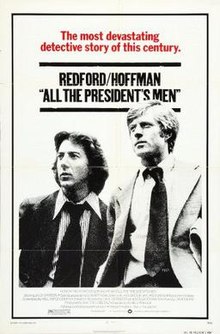
All the President’s Men
Okay, this is an obvious one. Trump is the new Richard Nixon (albeit without the brain), and Alan J. Pakula’s true-history drama about the Watergate scandal is a classic. Not only is it one of my favorite films about the press, but it’s also a powerful meditation on the role of leakers—tiny, anonymous people who decide to do the right thing, at great risk to themselves and their families—against the overweening power of the President. It’s also a damned fine film noir mystery, with the young heroes, Woodward and Bernstein, lurking through dark corridors and underground garages in search of answers.
 Good Night, and Good Luck
Good Night, and Good Luck
Another great movie about the press, George Clooney’s directorial debut is a fine drama about Edward R. Murrow, the great journalist who stood up to the outrages of Joseph McCarthy. Murrow (played with pitch-perfect deftness by David Strathairn in an Oscar-nominated performance) became famous as a radio commentator in World War II. By 1953, he had made the jump to TV and began airing stories about small, decent people who had been victimized by McCarthy’s anti-communist investigations committee (whose paranoia and fear-mongering are exactly matched by the rhetoric of Donald Trump).
Specifically, Murrow ran stories on U.S. Air Force officer Milo Radulovich, who had been forced to resign due to a Communist smear campaign targeting his father. As expected, the stories created a fire-storm of controversy, much to the chagrin of Murrow’s sympathetic but pragmatic boss, CBS’s CEO William Paley (played brilliantly by Frank Langella in one of his signature character roles). Good Night, and Good Luck is a fine film that reminds us the press can—and must—stand up against the forces of tyranny.
 The Hunger Games Series
The Hunger Games Series
As I’ve written previously, The Hungers Games series is a brilliant depiction of what a futuristic, Fascist society might look like—one in which some people are enslaved while others wallow in gilded, high-tech decadence. The Hunger Games imagines America as a reborn Roman Empire, led not by a Caesar but by a President (ahem), who executes his enemies with ruthless aplomb. It’s entirely fitting that the hero of these movies is a young woman whose strength, bravery, and compassion are the opposite of everything the ruling class represents. (And, for that matter, everything Donald Trump represents.)
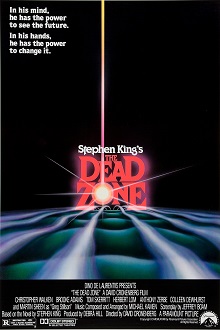 The Dead Zone
The Dead Zone
David Cronenberg’s 1983 of Stephen King’s novel is a great movie (I described it as a “Perfect Film”), but it might seem an odd choice for this list. The story of a brain-injured man, John Smith, who wakes from a five-year coma only to find that he has the power of precognition, the movie belongs here for two reasons. First, it’s the perfect encapsulation of King’s greatest theme, that of a small, physically fucked-up underdog who confronts overpowering evil with courage and cleverness. Second, it accurately predicts the rise of Donald Trump. This occurs in the character of Mike Stillson, a rabble-rousing, neo-Fascist politician whom (as Smith foresees) will one day become President and start World War III.
I’m not kidding—Stillson is Trump to a “T”.
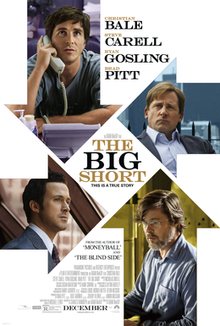 The Big Short
The Big Short
“I have a feeling, in a few years people are going to be doing what they always do when the economy tanks. They will be blaming immigrants and poor people.”
So says one of the central characters of The Big Short, Adam McKay’s brilliant adaptation of Michael Lewis’s fascinating non-fiction book. The line is uttered by Mark Baum, a disillusioned Wall Street money-manager who, along with a few other clever traders, predicted the 2008 U.S. housing market collapse that almost triggered another Great Depression. Baum and his fellow “shorts” are the putative heroes of the story, who endured the ridicule and mockery of their Wall Street colleagues and ended up making vast fortunes (at the risk of their souls) from the crisis. Baum, however, is the most compelling character. As played by Steve Carell in an Oscar-worthy performance, Baum isn’t just after a big pay-day; he wants revenge. That is, revenge on the corporate-run oligarchy that has been screwing the average American for decades. (And whose greatest triumph, to date, was the election of Donald Trump, who cut their taxes and somehow managed to shift the rage of the American people to those very “immigrants and poor people.” Sheer genius.)
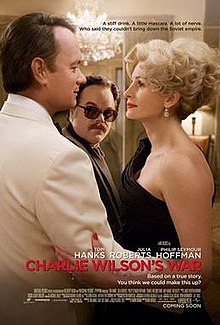 Charlie Wilson’s War
Charlie Wilson’s War
Tom Hanks began his career making comedies about “chicks and dogs,” as he put it. But after winning two Best Actor Oscars in the 1990s, he made a niche out of brilliant, non-fiction films about American heroes, from Scully to Captain Phillips.
Of course, the term “hero” can only be loosely applied to Charlie Wilson, the hard-drinking, coke-snorting, groupie-shagging Democratic congressman who, after a mid-life revelation, masterminded the covert CIA operation to defeat the Soviets in Afghanistan.
I love this movie for all kinds of reasons, but mainly because it depicts a “smart” Southern politician. Charlie Wilson was a Democrat, but he was also from west Texas, and his “Guns-God-and-Guts” campaign platform would have made him a staple of today’s GOP. His main ally was an ultra-rich, Evangelical Christian lady, Joanne Herring (played by a luminous Julia Roberts), whose love of Jesus was surpassed only by her hatred of Communism.
Ultimately, Charlie Wilson’s War is about an essentially selfish man who finds within himself a basic human decency and patriotism that lead him to save a Muslim nation.
Liberal Democrats take note: Southern rednecks and can be smart, shrewd, and effective. Not to mention compassionate and open-minded.
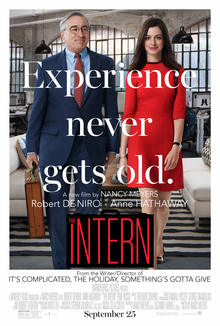 The Intern
The Intern
I’m including this movie because it’s funny as hell, and, more importantly, it features two things Donald Trump hates. First, the actor Robert De Niro. Second, anything having to do with a successful, smart woman.
De Niro plays Ben, a retired executive who, out of sheer boredom, takes an internship at a local dot.com. He ends up working for the founder, Jules (Anne Hathaway), a brilliant and chronically overworked CEO whose job is tearing her marriage apart. The genius of The Intern lies in how it suggests that Jules is a modern-version of Ben. For all her high-tech, post-industrial savvy, Jules is just as much of a dedicated American capitalist as anyone from Ben’s generation. Ben senses this, and he musters all of his wisdom and experience to help her succeed.
In short, this movie is about everything Trump is not: optimism, cooperation (between sexes, generations, etc), feminism, and—most of all—capitalism. (Come on! Trump is not a capitalist. He’s a trust-fund kid whose never made a real buck in his life!)
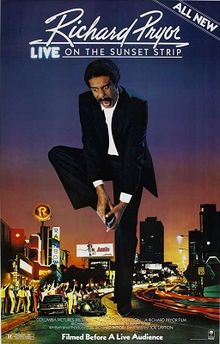 Richard Pryor: Live on the Sunset Strip
Richard Pryor: Live on the Sunset Strip
If there’s anything Trump hates more than feminism, it’s people of color. So, who better to give Trump the Big F.U. than the funniest black comedian (actually the funniest comedian, period) who ever stormed a microphone?
But seriously. Racism is at the heart of Trump’s voter base (don’t let anyone tell you otherwise), and few entertainers have communicated the cruelty of racism with more humor or compassion than Richard Pryor. Raised in a brothel run by his grandmother, Pryor was a genius who turned his pain into pure, red-hot comedy. His shows were so poignant and brilliantly constructed that they felt more like one-man plays than stand-up routines.
Live on the Sunset Strip is an especially appropriate show because it marked Pryor’s come-back after nearly immolating himself in a drug-related fire (a perfect metaphor for our own situation under Donald Trump, I would argue).
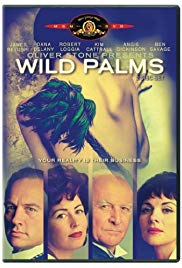 Wild Palms
Wild Palms
Okay, this is a bit of stretch because it’s a TV miniseries, and I’m not even sure you can get it on DVD. But if you can, it’s definitely worth a watch. Produced by Oliver Stone, Wild Palms is a dystopian science fiction story about how the marriage of high-tech corporate media and national politics might create a semi-Fascist society, on the model of Argentina or Chile. The really creepy thing about his movie is that the central character, Harry (James Belushi), doesn’t even realize he’s living in a dystopia—until he people he knows start disappearing (ala the Desaparecidos, the “vanished” victims of South American dictatorships).
Robert Loggia is the charismatic media mogul who is running for President. He is also the secret leader of “the Fathers,” a Fascist secret society, which plans on getting the entire U.S. population addicted to a virtual reality TV show. David Warner is a history professor and political prisoner who is also the leader of “the Friends,” a left-wing secret society that fights the Fathers. (They also throw really cool parties and do a lot of drugs.) Caught in the middle is Harry, the hapless Everyman, who finds himself repulsed by the sadism and violence of the Fathers.
Wild Palms is a trippy, fascinating vision of how our country might—and, alas, probably will—end up if Donald Trump and his circle of oligarchs keep power.
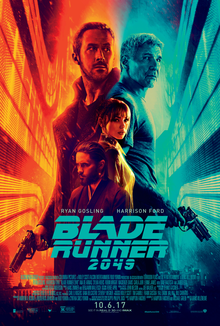 Blade Runner 2049
Blade Runner 2049
The fact that 1982’s cult classic Blade Runner got a sequel after thirty-five years was, itself, a kind of miracle. But the fact that it got made by a brilliant director (Denis Villeneuve) with a huge budget and a great script is surely an example of divine intervention.
Never mind the fact that Blade Runner 2049 lost money at the box office—it’s a great movie about dehumanization. Ryan Gosling is K, a replicant Blade Runner who hunts down and kills older models. He soon becomes embroiled in a mystery involving a dead replicant woman and her missing child. Quite literally, this is a movie about “family separation,” not to mention institutional violence and a class-system that is based on one’s genetic make-up.
In short, it’s the perfect film for the Trump era.
Like the original movie, Blade Runner 2049 is a hellish vision of what happens when living being become corporate commodities. Yes, it’s a call-back to the slavery era of the American south, and to the Holocaust. But it’s also a warning about the future—and the way men like Donald Trump dehumanize people (first “foreigners,” then Democrats, then….).